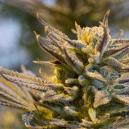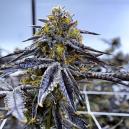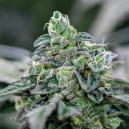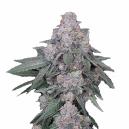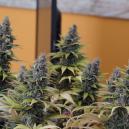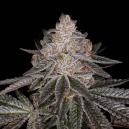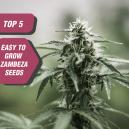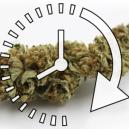10 Reasons Why It's Better To Consume Cannabis Than Alcohol
Published :
Jul 3, 2018
Categories :
Top 10

The ongoing debate about the safety and regulation of alcohol vs cannabis is surely coming to a close. Science argues that cannabis is a much safer substance, whereas alcohol is associated with a plethora of negative short and long-term side effects.
Cannabis and alcohol are two commonly used recreational drugs that exhibit extremely different effects. Stereotypically, alcohol is consumed at parties and gatherings as a social lubricant to increase confidence. Cannabis, on the other hand, is normally associated with a more relaxed atmosphere and sedating effects.
Although many people use both of these substances, there are those who elect to use only one, whilst claiming the other is no good. Cannabis purists will insist that alcohol damages health and leads to poor decision-making. Alcohol enthusiasts will claim that cannabis is bad for the brain and makes one lazy and stupid.
The truth of the matter is that cannabis is a far safer substance and has virtually zero association with overdose or death. Additionally, the herb has countless medicinal uses that are being uncovered constantly by scientific research, whereas alcohol is associated with a plethora of diseases, overdoses, and casualties.
Despite the stark difference in safety, alcohol remains entirely legal in many regions of the world, whereas cannabis is largely illegal. This decision is seen by many as being blatantly hypocritical, and possibly swayed by corruption and corporate influence as opposed to scientific reasoning.
Here are the top 10 reasons why cannabis is safer than alcohol.
1. ALCOHOL CAN CAUSE BRAIN DAMAGE
Alcohol has a strong influence on the brain, an effect that is extremely apparent after sinking only a couple of beers or a few glasses on wine. Alcohol leads to impaired judgement, slurred speech, slowed reaction time, and impaired memory. The drug also sustains long-term effects on brain health.
Alcohol use can disrupt a process within the brain known as neurogenesis, the process of generating new brain cells (known as neurons). Neurons are responsible for transmitting nerve impulses throughout the brain and nervous system via electrical signals and chemical messengers known as neurotransmitters.
These new neurons are primarily born throughout adulthood in two regions of the brain, the subgranular zone and the subventricular zone. Adult neurogenesis is associated with learning, memory, and emotion.
At the root of neurogenesis are neural stem cells, which divide and produce neurons. In animal models, alcohol use has been shown to disrupt this process and possibly contribute to deficits in the structure and function of the hippocampus, a region of the brain associated with long-term memory and spatial navigation. Researchers believe that decreased neurogenesis may be the underlying cause of neurodegeneration associated with alcohol use.
The effect cannabis has on the brain is quite the opposite, despite reports stating otherwise. Chronic cannabis use is linked to blunting of the dopamine reward system and agitation/initiation of certain mental disorders, however, cannabinoids may actually promote neurogenesis in adults.
A 2005 article published within the Journal of Clinical Investigation showed that a synthetic cannabinoid known as HU210 may promote neurogenesis via antidepressant-like effects. The cannabinoid targeted the CB1 receptor, the same receptor activated by THC.
2. ALCOHOL IS MORE TOXIC THAN CANNABIS
Are you ready for a mind-blowing fact? Weed is 114 times less deadly than alcohol. Yes, 114 times! This statistic is derived from a study published within the journal Scientific Reports that conducted a risk assessment of numerous drugs including alcohol, cannabis, and tobacco.
The researchers involved analysed the toxicological threshold of various drugs and placed them within ranked categories, depending on the risk they pose. Alcohol was placed into the highest risk category for individuals, along with the likes of nicotine, cocaine, and heroin. This is proof that despite its legality, alcohol is a highly dangerous and toxic substance to the human body.
The category below this consisted of diazepam, amphetamine, methadone, methamphetamine, and MDMA.
THC, a psychoactive cannabinoid, was placed into neither of these categories. This is due to the extremely low toxic nature of the chemical, and the low risk associated with its use. Ultimately, this study showed that alcohol and tobacco are far more dangerous than many illicit drugs.

3. ALCOHOL INCREASES THE RISK OF CANCER
Cancer is an infamous condition that is estimated to kill 609,640 people in 2018 within the United States alone. There are numerous causes of the condition, with up to 90% of cancers believed to be triggered by lifestyle factors. One of these factors is alcohol.
Alcohol is known to causes seven types of cancer, including breast, mouth, and bowel cancer. Cancer Research UK states that there is no safe limit for alcohol when it comes to cancer, and that the less one drinks, the lower their risk will be. Alcohol causes 3% of cancers within the United Kingdom annually, equating to 11,900 cases.
When an individual consumes alcohol, ethanol is converted into acetaldehyde, a toxic chemical that can cause cancer by damaging DNA and inhibiting cells from repairing this damage. This chemical also causes liver cells to grow faster, possibly contributing to the risk of cancer.
Alcohol also manipulates the levels of hormones within the body. It can cause increased levels of the female sex hormone oestrogen, which can in turn increase the risk of breast cancer.
Cannabis is showing great promise as a potential cancer treatment. The National Cancer Institute published a report regarding the health benefits of cannabis and some of its anticancer activity.
Cannabinoids activate certain receptor sites that comprise the endocannabinoid system. In doing so, they have been shown to induce cancer cell death in a process known as apoptosis. The endocannabinoid system is believed to play a regulatory role in tumour generation and progression.
4. ALCOHOL IS ASSOCIATED WITH VIOLENCE
We’ve all taken a stroll through town on a Friday night and seen some of the obscene behaviour that alcohol can incite. Even people who aren’t normally aggressive might become so after a few too many drinks, even lashing out at the slightest agitation.
Professor McMurran of the University of Nottingham states that alcohol reduces a person's ability to think straight. This cognitive shift can lead to committing acts without consulting our faculties of reason and debating the consequences.
Surprisingly, one of the reasons alcohol may promote violent behaviour is due to its sedative effects. Alcohol causes a chemical change in the brain that decreases anxiety, but certain levels of anxiety are required to detect danger. Without this alarm system working correctly, people may be more likely to enter confrontational situations.
5. ALCOHOL IS LINKED TO WEIGHT GAIN
Alcohol can lead to weight gain in some individuals, especially those who drink heavily. Alcohol is a caloric substance, with a single gram containing 7.1 kilocalories. When alcohol is combined with sugary soft drinks and unhealthy foods, weight can definitely be put on over time. Although drinking isn’t always associated with weight gain, several studies have found that it can contribute to excess energy intake.
6. ALCOHOL DAMAGES THE LIVER
Excess alcohol consumption is related to liver damage, a condition that can cause symptoms such as weight loss, decreased appetite, jaundice, swelling, confusion, and vomiting blood.
One of the primary roles of the liver in the body is to filter toxins from the blood, serving as a line of defence against external insult. The liver is a hardy organ that even has the ability to regenerate itself, an evolutionary investment that hints to its importance.
Every time the liver has to filter alcohol, some liver cells are killed off. If alcohol use becomes chronic and prolonged, new cells don’t get the chance to develop, leading to permanent damage.
7. ALCOHOL USE CAN LEAD TO NUTRIENT DEFICIENCIES
Long-term alcohol users are frequently found to be deficient in vitamins such as folate, B6, thiamine, and vitamin A. Consuming alcohol taxes the body heavily as it needs to draw upon its nutrient reserves to process the substance.
The very presence of alcohol within the body directly destroys certain B vitamins such as B9, B12, niacin, and riboflavin. B vitamins are essential water-soluble nutrients that play important roles in nervous system health, skin health, energy release, and blood formation. Deficiencies can result in fatigue, weakness, depression, confusion, vomiting, skin rashes, and other symptoms.

8. ALCOHOL CAUSES HANGOVERS
One of the best arguments for weed as a recreational substance is the absence of hangovers. Sure, you might feeling a bit groggy the next morning after a heavy session, but this state is far from the inherent suffering of a hangover.
Many people have experienced headaches, confusion, shakes, vomiting, dizziness, and dehydration the morning after excess alcohol consumption. This seems like quite the price to pay for a good time, but it's merely a biological response to what the body views as a poisonous assault.
Some of the horrendous sensations experienced by a hangover are caused by dehydration. The ethanol found in alcoholic beverages has a dehydrating effect due to increased urine production and electrolyte changes. Symptoms such as nausea, headache, and fatigue are believed to be caused by changes in the immune system. This is due to an imbalance caused by cytokine metabolism.
9. BINGE DRINKING BOOZE AFFECTS THE ECONOMY
Binge drinking is the act of consuming a large amount of alcohol in a single sitting. This form of consumption is believed to cost the United States economy an estimated $249 billion annually due to criminal justice costs, traffic accidents, and healthcare costs.
Although taxes generate $5.6 billion in tax revenue, the costs outweigh the earnings by far. In comparison, data from New Frontier Data suggests that the cannabis industry could generate over $130 billion in federal tax by 2025—if legalized in every state.
10. ALCOHOL HAS NO MEDICINAL VALUE
Alcohol is pretty much limited to a single use, and that is to loosen up socially and get drunk. Some people may use booze to ease anxiety and depression, but use in this sense is more pathological than it is medicinal.
Cannabis has an entire industry based upon its applications as a medicinal product. The herb contains hundreds of cannabinoids, flavonoids, and terpenes that display proven therapeutic properties. Even when used as a recreational drug, consumers are still getting some “unintended” medicinal effects on a physiological level.














